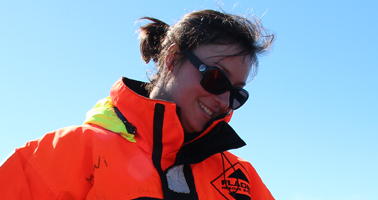
Research Associate Computational Research in Ice and Ocean Systems Group
Kirstin obtained a Masters degree in Applied Mathematics at the Technical University of Clausthal-Zellerfeld, and holds a PhD degree in Physical Oceanography from the University of Rostock in Germany. During her PhD studies with PD Lars Umlauf at the Institute for Baltic Sea Research in Warnemuende, she investigated transport processes induced by tidal asymmetries in continental shelf regions, using both observational data and idealized modeling studies. After graduation, she worked as a postdoctoral researcher at the Royal Netherlands Institute for Sea Research, first with Dr. Theo Gerkema to study sediment transport mechanisms in estuarine regimes, in the context of a pilot study for the beneficial use of dredged harbor sediments for coastal protection, and later with Dr. Dick van Oevelen to investigate the constrains of cold water coral growth and their food supply in the northeast Atlantic. Before starting her position at the University of Texas, she was part of the UK-German founded Changing Arctic Ocean PEANUTS project, led by Dr. Markus Janout and Dr. Yueng-Djern Lenn. In this project, she investigated changes in the Arctic Ocean turbulent mixing regime and their effect on the nutrient transport to sustain algae growth, and participated in the MOSAiC drift campaign on board the German icebreaker Polarstern.
Her main field of research are small scale mixing and transport processes in the ocean, and their implication for the distribution of tracers, such as suspended sediments and nutrients. Especially in the historically inaccessible Arctic Ocean, little is known about the specific energy conversion mechanisms that govern vertical transport. With ongoing climate change, the mixing regime in the Arctic is anticipated to change substantially, probably most pronounced in the steep continental slope regions in front of the Siberian shelves. Kirstin has been on several ship-based research expeditions, from the Baltic to the Caribbean Sea and the Arctic Ocean, and is familiar with data processing and analysis from most standard oceanographic equipment. In her current project GRISO, she also investigates the interaction of waters from the Arctic Ocean and tidewater glaciers in Greenland, which is again a region dramatically affected by global warming. To do so, she will make use of the CRIOS groups expertise in advanced computational modeling.